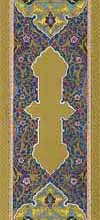Preface
AN
APOLOGY is hardly needed for bringing out this small volume on the
political
and cultural history of Muslim India and Pakistan. In the past the
study
of Muslim civilization has been largely confined to the Arab countries,
or at best extended to Iran or the Ottoman Turkey, but the need for
studying
the background of modern countries like Pakistan and Indonesia is too
obvious
to be ignored. Muslims in the Indo-Pak subcontinent number more than
100
millions, and the sections of the community dispersed in surrounding
regions
like East Africa, Burma, Ceylon are not without importance. Apart from
numbers, the story of this civilization is full of great achievements.
For several centuries Islam dominated the subcontinent which now
includes
India and Pakistan, and rulers like Akbar, Shah Jahan, and Aurangzeb,
in
addition to their achievements in the political and administrative
field,
left a rich cultural heritage. Above all, the history of Muslim rule in
India is the story of Islam in a predominantly non-Muslim environment.
This led to conflicts, tensions, and assimilations which make the
record
of particular interest to students of culture and politics.
In
addition to the political narrative which furnishes the essential
background,
the book gives an account of the cultural developments, the changes in
political philosophy and institutions, the rise of Indo-Muslim law, and
above all, those religious and intellectual movements which in the long
run proved more powerful than the mighty rulers. The general features
of
the cultural, administrative, social, and economic history have been
outlined
in separate chapters, but the developments in these fields which were
closely
associated with any particular period or regime have been summarized
along
with the political narrative of that period.
An
attempt has also been made to give a fuller background of events
relating
to the areas, like Muslim Bengal, that have gained in importance with
the
birth of Pakistan, but that did not receive adequate attention in older
historical works. This narrative naturally involves going over the
past,
but the ground has been covered, so to say, “ facing forward.” The
interest
in the happenings of the past is partly because of their contribution
to
the making of the present. This has led to devotion of greater space to
the political and cultural developments in the eighteenth century than
is customary. It was a period of transition and confusion, but modern
Muslim
India and Pakistan are more closely rooted in the eighteenth century
than
in the days of the grand Mughals, and the present cannot be understood
without a satisfactory study of the period which saw the rise of Urdu
and
the systematization of the local Islamic tradition by Shah Waliullah.
A word
must be said about the transliteration of the many words used from
Arabic,
Persian, and Indian languages. The spelling generally adopted is that
of
the Cambridge History of India, but the diacritical marks have not been
used. It was felt that these sometimes distract rather than help the
reader
who is not familiar with Indo-Muslim names and terminology. Some
spellings
that have been widely accepted in writings on Indian history have been
retained, even though they may not be strictly correct
transliterations.
This is especially true of place names. Furthermore, translators have
used
such a variety of spellings that consistency is difficult to maintain
when
quotations are given. It should also be remembered that the Urdu
version
of words is sometimes different from the Persian original, and it is
the
Urdu spelling which is common in modern India and Pakistan.
The
present volume is an abridgment of the author's fuller History of
Muslim
Civilization in India and Pakistan (712–1858), published in Lahore
in 1962. In compressing an account of such a long period in some 300
pages,
much has necessarily had to be sacrificed—including the long
introduction
on historiography of Muslim India—but the aim has been to ensure that
nothing
basic or essential is omitted in the abridgment. The success that has
been
achieved in this attempt is due to the thought and labor bestowed on
the
task by Professor Ainslie T. Embree of Columbia University. He took my
abridged version as the basis, thoroughly revised it, rearranged
certain
chapters, and even recast some portions, to make the material more
intelligible
to the Western reader and to improve the presentation. My grateful
thanks
are due to him. I also acknowledge with thanks a grant made by the
Rockefeller
Foundation to Columbia University, which facilitated the completion of
the earlier book.
S. M. IKRAM
Lahore, Pakistan
March, 1964
S. M. Ikram is a member of the
Pakistan Civil
Service and has on several occasions been a Visiting Professor of
International
Affairs at Columbia University. He has written a number of books in
Urdu
and English on the history of Islam in India and is the co-editor of The
Cultural Heritage of Pakistan. Ainslie T. Embree is Assistant
Professor
of History at Columbia University. He is author of Charles Grant
and
British Rule in India and co-editor of Approaches to Asian
Civilization
and A Guide to Oriental Classics.

